Toyota, renowned as the world’s largest car company, has often been perceived as an anti-EV automaker due to its cautious approach and reluctance to embrace the EV revolution.
Toyota maintained its course to focus on alternative options or rather specifically saying hydrogen path for its automobility future.
Instead of succumbing to the hype surrounding these vehicles, Toyota has consistently maintained its stance, emphasizing the need for battery technology to reach a certain stage before committing to the electric path.
However, recent revelations from the company’s “Let’s Change the Future of Cars” workshop suggest a shift in perspective.
After being called an EV-skeptic for ages, they’ve finally shouted from the rooftops that they’re ready to join the party. Cue the confetti cannons and the techno beats because Toyota is projecting that by 2026, the long-awaited stage for electric vehicles will finally be here.
Get this: their battery-powered beauties are expected to cruise an eye-popping range of 932 miles (1,500 kilometers) by 2028. Oh, and here’s the kicker—giga castings!
Yes, you heard it right. Toyota is now jumping on the Tesla train with their own Giga castings, proving that even the biggest skeptics can’t resist a little electric charm.
In light of these revelations, let us delve deeper into Toyota’s evolving stance and the significant implications it holds for the future of electric mobility.
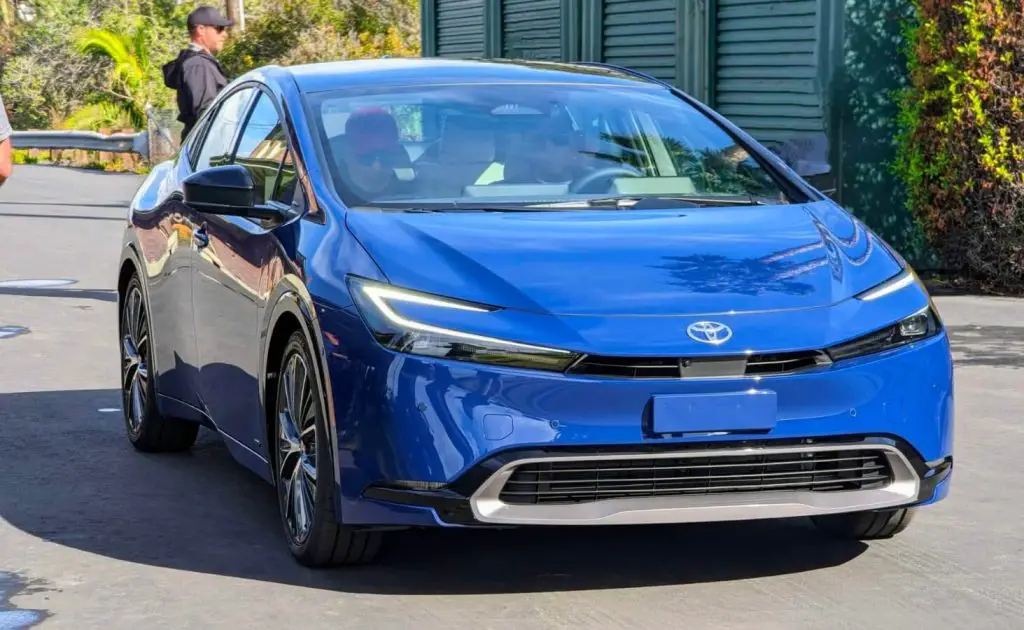
Table of Contents
Toyota and Electric Cars
Toyota, the Japanese automotive giant, is making bold strides in the electric vehicle (EV) sector with plans to develop an EV powered by a solid-state battery that boasts an impressive range of nearly 1,200 km (750 miles) and a remarkably short charge time of only 10 minutes.
In comparison, Tesla’s Superchargers can also provide approximately 200 miles of charge in 15 minutes. But, Toyota is aiming for a far better range boost.
Toyota’s ambitious goals were revealed as part of its new technology roadmap, which outlines the introduction of high-performance lithium-ion batteries for their next-generation EVs by 2026.
With these groundbreaking developments, Toyota is cementing its position as a major player in the electrification revolution and pushing the boundaries of what is possible in the world of electric mobility.
Solid State Battery
Toyota is bullish on the potential of solid-state batteries, citing substantial benefits in terms of range, cost, and charging time. According to their claims, implementing solid-state batteries could result in a remarkable 20% increase in range while simultaneously reducing costs by 40%.
Charging times could be significantly improved, with sub-30-minute charging becoming a reality. To put these advancements into perspective, let’s consider the current models in Toyota’s lineup. The bZ4X, starting at $42,000, offers a range of 252 miles.
With a projected 20% improvement, the bZ4X would exceed 300 miles, placing it on the higher end of the market in terms of range.
As for the Lexus RZ, which starts at $59,600 and has a range of 220 miles, a 20% improvement would bring it to a competitive 260-mile range, aligning it with most vehicles in the market.
These estimations demonstrate the significant progress Toyota anticipates with solid-state batteries, showcasing the potential for enhanced electric driving capabilities at more affordable prices.
Although Toyota did not disclose specific information regarding the vehicles that will incorporate solid-state battery technology and their corresponding ranges, we will probably witness its implementation in a forthcoming Lexus electric vehicle.
This assumption is supported by a significant company reorganization that took place in March, with the aim of positioning Lexus as Toyota’s flagship brand for electric vehicles.
Toyota Future Plans
As the race to commercialize solid-state batteries heats up, Toyota finds itself among the many automakers vying for a breakthrough in this technology. However, they are not alone in their quest.
In November 2022, Honda made waves with the announcement of a new polymer fabric designed to tackle the longevity issue plaguing solid-state batteries. While Toyota has unveiled ambitious targets for range and charging time, Honda has chosen to keep the details under wraps, leaving us curious about the potential achievements of their new batteries.
It’s an electrifying competition where every automaker is eager to show what they have in store in their electric tech.
While the commercialization of solid-state batteries may still be a few years down the road, Toyota isn’t sitting idle. In the meanwhile, the automotive giant has unveiled its short-term strategy to enhance battery technology.
Toyota plans to introduce a range of options, including high-performance packs, to cater to diverse customer needs. Among these offerings is a new, cost-effective “bipolar” lithium iron phosphate (LFP) battery, designed for the mass market.
With this approach, Toyota aims to provide immediate battery improvements and alternatives while keeping an eye on the promising future of solid-state batteries.
Toyota’s Recent EV Developments
Toyota expanded its EV lineup with two notable models in 2023: the bZ4X and the BZ3. The bZ4X, developed in collaboration with Subaru, is a compact SUV offering both front-wheel and all-wheel drive options.
With power outputs ranging from 201 hp to 215 hp depending on the drivetrain, the bZ4X boasts an estimated driving range of 222 to 252 miles (367 to 406 kilometers). Meanwhile, the BZ3, a sedan reminiscent of the Corolla and derived from the BZ SDN concept, features an attractive exterior design and innovative features.
Toyota is not only concentrating on innovative EV battery technology but also establishing a hydrogen business. This initiative underlines Toyota’s commitment to diversifying its energy sources and contributing to carbon neutrality.
What To Expect In The Future?
Solid-state batteries have the potential to charge at a much faster rate compared to lithium-ion batteries. This could significantly reduce the time required for charging an electric vehicle, making them more convenient and practical for everyday use.
Another substantial benefit of solid-state batteries is their enhanced safety. Unlike lithium-ion batteries, which contain flammable electrolytes, solid-state batteries use a solid non-flammable electrolyte material. This significantly reduces the risk of thermal runaway and potential fire hazards, thereby improving the overall safety of electric vehicles.
While Toyota’s breakthrough in solid-state battery research is certainly exciting, it’s important to note that there are still challenges to overcome before this technology can be commercialized on a large scale.
One of the main hurdles is the mass production of solid-state batteries at an affordable cost.
Currently, the production costs for solid-state batteries are considerably higher compared to lithium-ion batteries. Toyota, along with other companies and research institutions, is actively working to address these challenges and bring solid-state batteries to the market.
If successful, the implementation of solid-state batteries with a range of over 900 miles (1,440 kilometers) could be a game-changer for the electric vehicle industry.
This can significantly alleviate the concerns regarding range anxiety, making electric cars a more feasible option for long-distance travel without the need for frequent recharging.
Bottomline
In the images shared by Toyota, the large cast parts appear to serve primarily as structural components, and their construction differs noticeably from those employed by Tesla.
While the exact details remain undisclosed, this strategic move signals Toyota’s commitment to leveraging solid-state batteries in their luxury EV offerings, suggesting that we can anticipate exciting advancements and innovations in the Lexus electric vehicle lineup soon.
While there are still obstacles to overcome, the advancements in this technology hold great promise for the future of electric transportation.

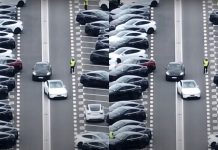
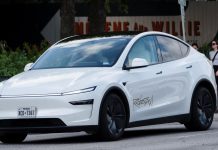
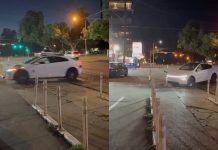
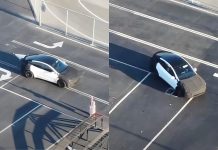
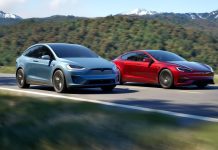








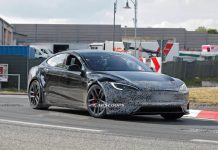
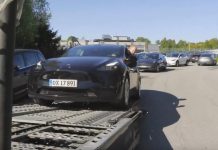
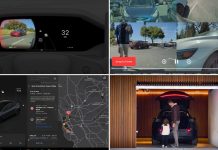
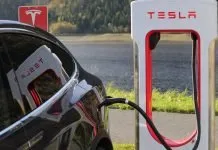

More like 2056. Just give some fake numbers 932 miles. Currently they are having hard time achieving 300 miles on bzx4 and somehow 930 miles is coming. Give us a break.
Worried, your Tesla will be worthless?
Whatever…Toyotas have lost all driving dynamics. Just bought a Tesla and drove literally everything. Out of the entire lot of choices Toyota was the worst. Yea the cars are built with total quality. They also drive like vanilla is to ice cream. The tech is weak and the model choices for anything hybrid or ev doesn’t even come close to anything else out there. Their electric car is downright pathetic-ugly, slow, the tech of a Corolla and no room at all. The Lexus es300h was about the only thing to consider. But again, slow as molasses and screams Grandpa. Bought a model 3 performance and its amazing. Yes it has fit and finish issues is you look closely. But the car looks amazing, has incredible tech and features, and is lighting fast not to mention all of the other perks that Tesla offers. Plus Toyota dealers has become the worst of the bunch. Had nothing but awful experience’s with them.
Yes, Tesla has incredible tech…like removing USS and no 360 degree view, lmao.
People literally ask is that camera 8k on the my model Y. I’m a mirror guy, but I’m converting to a screen guy!
Well said.
I too have driven many cars including Lexus sport offerings. Vanilla is a good way to describe it.
My Model 3 drives with the fun of my old BMW 325i manual with way more acceleration. Vanilla it is not.
🤝👍
I would be impressed if Toyota can match Tesla’s tech in 2028! They shouldn’t be bragging about the future, do they even have a EV that can reach 250 miles?
They are partnering soon. Much to be learned.
No, Toyotas are already worthless against Tesla’s.
Tesla has its own battery developers hard at work. Not much chance they will go obsolete.
The future will be here quickly
A lot of what I see on here is like they said historically when transportation changed to the Internal combustion engine for transportation from horse and buggy.. the internal combustion engine has reached it”s peak in development. We are in the era of battery powered development.. A tremendous amount of research is being done by a number of companies. Progress is being made and will continue until an appropriate amount of mileage is achieved with a very slow charge time. I retired after 30 yrs. with General Motors..( my comment will probably bring attacks on GM and all their terrible products) lol..I appreciate intelligent comments such as yours..
Screw you Debbie downer
This article actually compared current battery tech to future battery tech that hasn’t even been developed as a concept.
Agreed. And if it was reality (for real) in a few years, why in the World would anyone buy an EV now. There’s no way as you’d have an obsolete car you just spent 40k to over 100k on. I’m calling BS on the range and charge time by Toyota or BS on this article if Toyota has not announced this.
Most comments are by immature Tesla fanboys. Tesla is dead. Prices plummeted and poor quality and stale technology. Toyota will be light years ahead of Tesla in 2 years.
@Matt – I have trouble believing this. I’ve been betting Toyota will make a splash in the EV space and the first car they made with Subaru has wheels-falling-off-axel and poor range. They seem to be starting from zero, not unlike Vinfast.
Don’t get me wrong: I want more competition. They truth is Toyota squandered a 15 year headstart on batteries with hydrogen before throwing in the towel on that tech.
I have a Toyota RAV4 Now ,and I know that Toyota makes Reliable cars.
But for their claim for batteries with 900 miles ,I (as an Engineer with more than thirty years experience in Industry)should mention that ,It is now just a claim , It should go through a performance test ,at least two years, to prove itself ,to be reliable and safe.
What a Doubting Thomas you are!
That is for the solid state battery. Totally different technology, so no break needed.
Even if it was a typo (mi instead of km) that puts it at around 579 mi (932 km) which is still far from what they have achieved?
Is this written by Toyota? I mean it screams “Toyota paid us $$ to write this drivel”. In reality, Toyota has been promising Hindenburg cars, coming juuust around the corner, since 1995 at least with their hydrogen fool cells. Meanwhile Elon, the father of EV industry and creator of this market, showed us how EVs should be. As someone who replaced 2 gas cars with Tesla and driving EVs since 2019, I can tell you you don’t need to wait for Toyota and their scam of “coming just around the corner”. Just buy a 310mi Tesla. You can easily go across a half a dozen states as I have done without any worry or issue. No one drives nonstop for 8hr or even 6hr. Most drive 4hr tops before a break. At 60mph avg that’s 240mi driven. Then easily charge while you rest and eat for 20m at Tesla Supercharger. For daily commute which is less than 80mi for most, you don’t need 932mi (where did they even get this from? Based on what? For a car from 2028. Lol. Which simpleton believes this or that Toyota is a giant or leader? Toyota will be bankrupt by 2030 tbh. They and their Fool cells are a Hindenburg and we all know how that ended.
Someone sounds Butt hurt
Daddy Elon.. Mr. Swooped in and bought out (stole) a legacy from two real engineers with their Tesla Roadster.. you know the one Daddy E sent (but didn’t send) to space a couple years back? Father of EV – that’s funny I didn’t realize you could steal (oops buy) that title and somehow get people to support it. I was wrong..right? 🤨
You and your fabulous TEKLA
I might buy a Tesla, but then Elon opens his mouth and “removes all doubt.”
I never get this. People literally not buying the best option because you don’t like the CEO? So yeah I’d rather spend more and get less because the guy said something I don’t like. 😂 Meanwhile other CEOs don’t even know how half their cars are built or how to use them.
“best option”??? You should look up reliability and see where Tesla falls. Father of EV? OMG!! Another crazy comment. How long has Toyota been profitable? What’s its reliability like? How long has Tesla been profitable? How many makes/models has it successfully deployed vs. Toyota?
Too bad he hurts your snowflake feelings!
Just because Toyota isn’t there yet doesn’t mean Tesla is what EVs should be. Tesla has done a decent with the drivetrain but that’s not all that goes into making a good car and in general Tesla doesn’t make very good cars. They aren’t very reliable. They need repairs frequently, poor paint jobs, poor materials quality, poor build quality, uncomfortable seats and some poor design decisions.
An EV currently isn’t practical for me due to the fact that I can’t charge at home at public charging is too slow and inconvenient and range is too short right now. I look forward to the day that changes and an EV becomes practical for me. I don’t know what’s in Toyota’s future in terms of EVs but as a long time owner of Toyota vehicles (the most reliable brand on the road) I’m confident they’ll end up with the same quality for their EVs as well. I don’t know what brand of EV I’ll get when the time is right. All I do know is that is will absolutely NOT be a Tesla.
Oh so you know nothing about EVs. You don’t have a standard wall outlet in your garage? Also it is 18 minutes to charge at a Tesla supercharger. I guarantee you over the course of any single month you spend way more time filling up your legacy dinosaur ICE car than I spend charging my Tesla model 3.
👍
It takes way less time to fill up on gas vs a super charger. Like 5 minutes. and on the supercharger you only get 200 miles correct in that much time (15 minutes)? It won’t be to capacity because it’s bad for the battery, right?
I guarantee you that I can fill up my Camry in 5 minutes and drive 400+ miles. Let’s drive from Milwaukee to New Orleans and see who spends more time at the pump
Same here!
Another Toyota imaginary battery lol
Until that car is available for purchase, this is just vaporware.
Lol. Wtf was this. You do realize a hybrid system is more complicated then a full EV. Hybrids are EVs. And Toyotas been making them for a while now.
Electric car idiots, electricity is a finite and very expensive to generate and transport power source. Everyone is believing in an electric car revolution just because they love the huge screen on the dash, the acceleration and the suicidal self-driving, but has anyone thought that if 100% of cars become electric, electricity demand will shoot through the roof and that will make it unaffordable not only for car owners but for residential users as well? Of course fossil fuels will eventually be depleted but the only way that the complete worldwide fleet can run on batteries is by carrying some sort of on board generator (which make them hybrids, like hydrogen “fool” cells) or by developing a much more efficient battery/power-train combination… Idiots an carmakers fans will still focus on arguing about who is winning the autonomy battle. Asian carmakers don’t get carried away by the hype and the race to become pioneers, they learn from other people’s mistakes and that is why they have been number one for decades.
Don’t vote for Gavin Newsom if he should run. I live 5 miles from the California Capital and the tents they litter the sidewalks that surrounded this city is all Gavin and with the electricity that they are calling for, our country will be in a Blackout if this goof gets into Office. These politicians don’t listen to facts from our engineers and even Daddy E. Daddy E even stated many time that there should be other type of vehicles. We don’t have the infrastructure to be an All Electronic Society.
Wow that was an incredibly stupid comment. If must be painful being that big of an idiot.
Lmao you must be really good at swimming. That empty head must float very well.
I was ready to take advantage of all tax credits and rebates. Then I talked to my insurance agent. I’d end up paying more for insurance than the EV after all all credits end rebates. No thank you
Even if anybody were willing to pay for that many batteries in their car they would get punished by the massive amount of weight it adds. And if they can truly charge this fast surely something like 400 to 450 miles of range would be plenty.
What an absolute joke of an article. I am also making an electric vehicle that will achieve 50000miles on a 1 sec charge and will do 0-60 on 0 secs and will cost $5. Coming soon in 20never.
You got that right 👍 bro
Totally agreed. The title of the article suggests that the technology has been developed. This totally misleading crap is it really tiring. Sounds like it was written by a bot.
There’s enough renewable resources in the world to power a thousand times the energy we need we just have to make the solar panels and wind turbines and other types of generators to harness it.
You will all be rushing out to buy another ev, only to learn you don’t get whats advertised exactly for an affordable price. Then make an excuse for the company of why it doesn’t work correctly. And then do it again in 5 years. Then realize that you have been conned…
You will all be rushing out to buy another ev, only to learn you don’t get whats advertised exactly for an affordable price. Then make an excuse for the company of why it doesn’t work correctly. And then do it again in 5 years. Then realize that you have been conned…
Electric cars don’t fight pollution or “climate change” as long as the power their batteries store is produced by fossil fuel burning power plants. We need more nuke plants and fast along with grid updates.
Half true. ICE cars are horribly inefficient, something like 70% of the fuel’s energy is wasted in heat and sound, while power plants can get far better efficiencies. It’s less pollution and more efficient to charge an EV from the same gasoline you would use to drive an ICE car the same distance.
Actually they gave bigger carbon footprints
agree with Richard. introduce small nuclear plants along with wind, solar, clean coal and host of already existing technologies- our planet will be liveable for the future generations. Fusion energy may be in breakthrough stage in a few decades.
Assumption of 932 mile range EV is smoke talk if is not available. Just like making a flying car practical for common use not possible. Put it to work in the reality world so @@
Wanta coulda shoulda woulda isn’t a plan. Too little too late as their ICE sales have collapsed in China, and facing it worldwide as the market shifts to EVs. Worlds most indebted company is facing consolidation bankruptcy or bailout as they have no competetive scalable profitable EV to offer.
932 miles of range in 10 minutes? So that would be pushing about 1.8 megawatts of power through that charging cable. I call B.S.
Doing the math based on 5 mi/kwh (more efficient than Teslas) I get north of 1 megawatt of power to perform such a feat of charging. More than 2200 amps at 440 volts. Doesn’t even pass the sniff test.
They should have inserted the word “capable” of charging that fast. Certainly no home charger and virtually no commercial supercharger in existence today would be able to provide that much power in 10 minutes!
If you’re going to throw out a bizarre term like “giga casting,” you should have the decency to define it so your readers don’t have to stop reading and search the web to figure out what in the world you’re talking about.
The future will be here quickly
I was born in the sixties and the world has changed incredibly fast in my lifetime. EV naysayers just don’t realize how fast technology improves. New and better batteries will be created, the infrastructure to handle all the electricity will be built, and the efficiency of EV’s will be increased. Just look how much the cell phone has evolved in such a short time (including the building of cell towers).
As for the article, that would be a lot of improvement in such a short time but nothing is impossible as far as technology is concerned.
Toyota willbmake better ev
I m sure they will have 2000 miles one charge
Extend the range distance of the car by topping up the battery as you glide down the motorway. Change the front end look by having multiple Fan dynamos. A bit like hydo-electricity but instead of water the fast air blowing into the front of the car to drive the fan/dynamos fed to a regulator then the battery. Good for motorway driving to extend the distance of the car.
Colin.
Yeah…. won’t work. Basic physics. The drag created cancels any efficiency gain. Might as well just use the drive motors to generate while coasting
The appropriate comparison would be a wind generator. What you suggest would create a net negative result, meaning more power used than produced.
Will be years of technology improvement before considering any fully electric car.
Currently have a Toyota Hybrid Cross (batter/fuel). Over the moon with it! Averages 85 mpg in summer, 80 mpg in winter, and no need to charge.
People I know who have electric cars, have had to hire a car to go on holiday in U.K. as too few public charges. Had to have a night in a Travelodge as not sufficient charge to complete the journey and stopping to charge would have taken the journey well past their bedtime. Won’t travel above 60 mph on a regular motorway journey as going at 70 would mean stopping to recharge.
As I said, over the moon with our Yaris and technological improvements will need to be immense to change!!
I worked in the forklift industry.
Read an article , in a trade rag, in early 2000s.
The claim was a Texas Company had “cracked the nut” on having a controlled discharge from a capacitor type storage device that was going to change the world.
Even mentioned Fun Car of Columbia was collaborating on putting device in car. After that story, crickets.
I wonder if anybody can pick up the thread because it would charge almost immediately according to article
Let’s assume the EV gets 4 miles per kWh – a reasonable efficiency number. This would come to over 200kWh of charge in 10 minutes, or a charging power of at least 1.2 MW (yes, megawatts). Hard to believe a solidly state battery could take on that kind of power – or that a charging facility could provide that kind of power…would need to either be really high voltage (>1 kV) or high current (hundreds of amps). Seems a bit unrealistic. I’m curious as to how this might be achieved
This is all BS. Wait to see what actually comes and how many large problems are created.
So first the initial stories said this new solid state battery was going to give them 700 miles, then the 900 mile stories come out, now 932. They are claiming a victory with this technology revolution without actually showing any of the tech in a demonstration or how they would scale it for a car. It’s all theory but they act like it’s already a done deal and in cars drivable today. This is pure marketing hype.
I have not heard any consideration for what the real mileage is on any of these vehicles when you load them with full size adults, luggage when traveling, and having to run either the AC for my area, (Las Vegas) or the Heat when I’m with my family I’m Montana mountain driving. And if you get caught in a storm in rural areas, there’s no place to charge. Or with your phone charger plugged in, etc. what about giving us some real use stats.
And as some comments above said, don’t brag on something you haven’t done yet either!!
There is no way you can charge any battery with that range in only 10 minutes. How many watts will it take?
What does one of EV BATTERY cost?
and weights?
Kill all chinks as chinks are stealing western technologies.
This article is the biggest bag of BS I ever seen.
I got a battery to go 5,000 mi on one charger take 12 seconds.
2300 at the earliest…
I honestly think this is a stall tactic on Toyota’s part. After all, who’s going to go out and buy an expensive EV today when a HUGE breakthrough is promised for tomorrow? They’re nowhere near having this technology and the date will be vague and continued to be pushed back while they sell loads of ICE and hybrid vehicles while people wait for this unfulfillable promise.
Bull. Toyota have been saying for a long time we have the technology
Bull. They have been spinning a lie. Trying to keep there investors happy. Sadly they are trying to stay alive. However there reluctance to change in the past will only show that they will be left behind. Toyota RIP.
I love it and I also work for an electric car battery company
It sounds like someone is worried…. Here comes toyota like it or not they are the future. World class engineer. Tesla drivers every time you get into your car you are rolling the dice.
Toyota’s new IMAGINARY battery tech.
There. Fixed it for you.
Toyota dealers sucks
932 miles on a charge of only 10 minutes time? A simple calculation of how much energy has to be stored in the batteries, how heavy the batteries have to be, then how much power is needed to transfer that energy from the power grid to the batteries in just 10 minutes just show how full of BS is this article.
932 miles on a charge of only 10 minutes time? A simple calculation of how much energy has to be stored in the batteries, how heavy the batteries have to be, then how much power is needed to transfer that energy from the power grid to the batteries in just 10 minutes just show how full of BS is this article.
Why would Toyota make a car with 900+ miles range? Just last year they were crying saying all the lithium should be saved for hybrid cars. Didnt back in 2018 Toyota promise a solid state battery Tacoma by 2023?
Tesla and China will obliterate Toyota, apparently not everyone knows this.
Note that Tesla’s batteries are made by Panasonic, a Japanese company. Sony being a Jap has the technical knowledge as well. So, we just wait and see..
All of this new EV technology is coming as Toyota signed a partnership with BYD
So toyota come out with solid state battery with 900 plus range it hard to believe don’t just write stuff for people to read , you know Elon Musk and his engineers are the best of the best in this world , i have 6 years old model x 100d it ran perfectly and my wife 2020 model y also ran perfectly right now I don’t see anybody can even come close to tesla
I think they may have meant feet instead of miles.
Probably outta bottle up some fairy dust and unicorn farts first. The ev market has already been pushed passed the point of practical support. Rapid charge stations already prove that because most, if not all, are powered by huge diesel generators. The rate of transfer for that volume of current is impossible and will likely still be impossible at the time this fairytale car is supposed to exist.